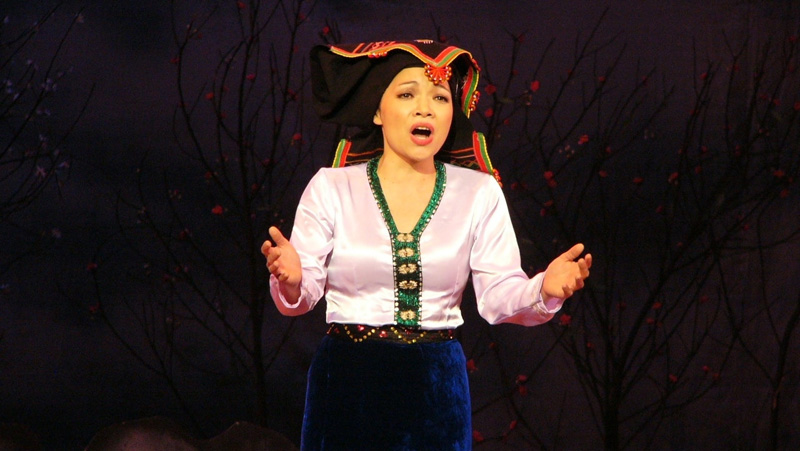


|
|
|
|
Question: Working as an opera singer in Vietnam, a country where
opera is not very popular or appreciated by a majority of the public, might
be a tough and challenging journey. How have you dealt with this?
Opera singer Ha Pham Thang Long:
Everything is not too tough for me so far. I am lucky enough to work with
good lecturers and friends, who have greatly supported me in my career.
During my study and training, I haven’t thought of the difficulties, but I tried
my best for the best result instead.
Before choosing to follow the arts, I had it set in my mind that
my job should also contribute to the country. To ensure my living, I also
took on extra work and worked overtime but I don’t consider that a hardship.
Fortunately, our generation also received financial support from
foreign cultural funds to stage operas, which brought us more opportunities
to hone our skills.
You are one of the few artists who have dedicated their entire
careers to opera. How have you nurtured your passion for the theatre?
First of all, you have to love your career, and if you want to
love it, you have to understand and explore it. The more I research and
explore opera, the more I fall into it. Someday your durable work will be
rewarded by the appreciation and positive feedback from society.
The young opera singer Ninh Duc Hoang Long won first prize at
the 9th International Jozsef Simandy Singing Competition recently held in
Hungary and has raised a strong hope for a talented young generation
of Vietnamese opera singers. What do you think about this?
I highly appreciate Long for his passion for and serious working
manner in opera. In fact, we have a number of students who are well-aware of
their job, but they haven’t yet been offered a good opportunity to shine.
There are three major factors in the success of an opera singer:
practise, and support from family and society. The third factor is not fully
met in Vietnam as the people show less favour for academic arts. Therefore,
those who can show off their talent abroad like Ninh Duc Hoang Long are
admirable.
What is the main reason for the unexpected development of opera
in Vietnam in your opinion?
I think it is mostly because of people’s awareness and liking.
In Vietnam, people show more interest in popular music rather than opera and
chamber music.
However, we should not compare it with the development of opera
in developed countries, which are the cradle of classical music and where
artists are provided with more opportunities. However, a career in the arts
is a tough journey no matter where it is. The arts environment in foreign
countries is even more competitive than in Vietnam, forcing students to
perform at their best to win a slot on the stage.
There is a fact that classical music singers are now heading to
folk music and other musical genres in order to earn their living. What do
you think about this?
It is understandable because the size of the audience and space
for classical music is very humble. I think that singing different styles of
music doesn’t affect the singer’s voice if they can master the skill well
enough to be versatile in other singing genres. However, it is important to
maintain a serious working manner while engaging in the arts.
After years of being devoted to opera, what are your reflections
on the job?
I hope for a better treatment for opera artists, who have to
spend months practising in order to put in a good performance over a two-hour
show. We have a lot of talented and passionate young opera artists, but they
still seem to be confused about the tough path ahead.
For years we haven’t staged a grand opera, thus students have
less opportunity to show off their talents. It costs billions of Vietnamese
dongs to stage a grand opera, so we face a severe lack of funding for it. I
think it is necessary to make further investment in the academic arts,
particularly those from the State.
Thank you so much for your sharing.
|
Source: NDO